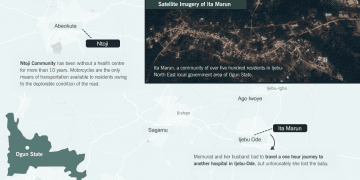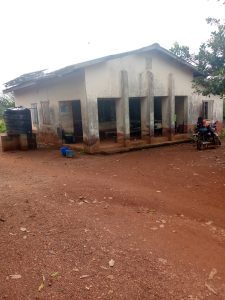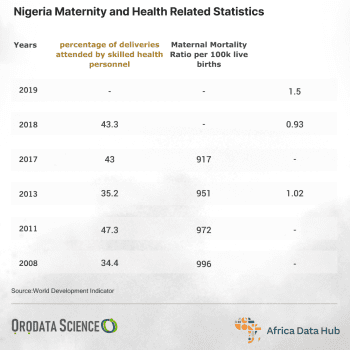By Fasilat Oluwuyi
April will always be a month to forget for Memunat Alabede’s husband. Losing a new baby in prolonged labour due to the negligence of other persons and government inaction could be an eternally painful memory.
On that day, September 20th, Memunat Alabede had just returned from her farm a few hours before she went into labour around 11 pm. Her husband immediately put her on his rickety motorcycle and rushed her to a health centre. But the nurses who ought to attend to her were already closed for the day.
The health centre is the only facility in Ita Marun, a community of over five hundred residents in the Ijebu-North East local government area of Ogun State.

Because there weren’t any nurse to attend to her, the labour pain became unbearable for Memunat. Her husband had to commence a one-hour journey to another hospital in Ijebu-Ode. Unfortunately, she lost the baby.
“My baby would have been saved had I been attended to on time but I lost him.”
Apart from Memunat, many of the residents of Ita Marun have struggled to get timely medical attention.
My baby almost died
Like Memunat Alabede, Mrs Maria Simon went into labour late on the night of June 26, 2022 when the health centre at Ita Marun had closed for the day. She had to make the torturous one-hour journey to Ijebu-Ode.
‘’I was so stressed on getting to the health care centre at Ijebu Ode, Mrs Simon said.
“We spent close to 45 minutes on the bad road as the road is really in bad shape. I was so afraid I’ll lose the baby. All these wouldn’t have happened if the nurses at the centre were there that night.
Her husband, John Simon, said the nonchalance of the health workers at the health centre is endangering lives.
He claimed they only attend to patients when they please.
This claim was confirmed during this reporter’s visit to the centre as the nurse on duty who ought to attend to some accident victims by giving them first aid directed them elsewhere saying it is out of their jurisdiction.
Centres deplorable state
The health centre is a decrepit building. A fading signpost in the front. But you can hardly tell what exactly is written on it.
A screen door with its net torn, can barely keep rodents and lizards out of the building.
The windows, made of planks, are housing colonies for termites.
A nurse had just finished delivering a patient of a baby in the dingy labour room when we visited. Its windows are made of torn cardboard boxes; not strong enough to keep animals and nature at Bay. A grimy wash basin is in the corner, too unsanitary for its purpose.
The toilets were a cesspit.
All these made the health centre look like a haunted house out of a horror flick.
Although the State Commissioner for Health, Dr. Tomi Coker said in May 2 that the government would distribute ambulances to health facilities in rural communities, no tricycle or ambulance was seen at the health centre.

Lack of drugs, staff shortage leaves women at mercy of quacks
Apart from the state of disrepair of the facility, Ita Marun health centre is also battling acute shortage of staff and consumables like drugs and injections.
“They couldn’t give me any drugs, I just had to go and look for money to buy the drugs,” said Olayinka Sunday, who had taken her sick child to the centre. “As the centre is, there are no permanent nurses or doctors at the centre. If we go for treatment they’ll say there are no drugs at the centre.”
Another resident, Hannah, said the inability of the government to provide drugs puts a financial burden on the people.
“I had to go back to town looking for drugs as I wasn’t given drugs at the centre despite the fact that I was not financially capable,” Hannah said. “I had to borrow money to get the drugs at that time”.
In 2017, the Federal Government through the National Primary Health Care Development Agency (NPHCDA) began the Primary Health Care Revitalization Initiative with the aim of resuscitating over 10,000 PHCs across the country.
https://datawrapper.dwcdn.net/bz0lN/1/
Years after PHCs like Ita Marun health centre still beg for attention.
Increase patronage at TBA centres
With the centre almost moribund, , some pregnant women in Ita Marun have resorted to patronising traditional birth attendants despite the risks.
“I won’t lie to you, you see I gave birth to my two children at home(TBA),” said a woman who identified herself as Iya Monday. “I believe it’s better than coming to see the nurse at the centre here.
“Most people I know who frequent the centre for antenatal care always come back with one complaint or the other but you see that our mothers do it with God’s grace and I don’t like to go to any centre to deliver my baby.
Also, corroborating Iya Monday’s is another resident who identified herself as Ayoade. She claimed she attended antenatal clinic at the PHC but gave birth at the TBA home.
“Yes, I attended antenatal there at the clinic but I gave birth to my child with one of our mothers (TBA),’ she said
High risk of maternal mortality
According to World bank , Nigeria records a total of 917 deaths per 100,000 live births as of 2017, making the country the fourth African country with the highest maternal mortality rate after Sierra Leone. South Sudan and Chad take the first and second positions on the list.

UNICEF says Nigeria’s 40 million women of childbearing age (between 15 and 49 years of age) “suffer a disproportionately high level of health issues surrounding birth.”
While Nigeria represents 2.4 per cent of the world’s population, UNICEF said it currently contributes 10 percent of global deaths for pregnant mothers.
Similarly, globally over 800 women according to UNICEF, die each day from complications in pregnancy and childbirth. And for every woman who dies, approximately 20 others suffer serious injuries, infections or disabilities.
According to Maternal Figures, more than 50,000 women die during childbirth in Nigeria every year.
https://datawrapper.dwcdn.net/mdjQv/1/
Women in Ita-Marun are prone to maternal mortality due to their lack of access to quality health care.
Another resident in Ita Marun, Mrs Adeoye also lamented that the poor condition of the PHC often put many away to patronise unqualified health personnel.
“If you look at the PHC you’ll see that it needs a lot of renovation and basic equipment which are not readily available at the centre, thus most people don’t like to usually go there,” she said.
Harrowing experiences in Ntoji, Odeda community
About 129 kilometres away from Ita Marun, women in Ntoji, a community in Odeda, tell the same bitter stories.
The community has been without a health centre for more than 10 years.
A resident, Yetunde Ogundele, said she and other women in the community travel as far as Abeokuta, about 33 kilometres away. The journey usually takes about 1-hour on a motorcycle.
Just like its counterpart in Ita-Marun, in this community, motorcycles are the only means of transportation available to residents owing to the deplorable condition of the road.
When the centre was still active years back, it was gathered there were no staff to attend to patients, especially pregnant women.
“When women are in labour most times, they’ll have to deliver at home due to the fact that there are no nurses to attend to them; some even end up losing their babies,” Ogundele said
Another resident, Moni Olojede, said women in the community go as far as Odeda, Emulu and Abeokuta to access healthcare.
“Our pregnant women have to go as far as Odeda, Emulu or Abeokuta to give birth. We have to travel more than an hour to access healthcare facilities, with bikes on the bad road.
“We continue to call on the government to continue to help us so our women can deliver safely.
“We do not have a good road linking the town and it is always a challenge. When we have goods to take to the town, we do not get a cab to convey them out of the village. The roads are really bad and we pray for God to assist them so they can help us to make it work better.”
Ray of hope
The future looks somewhat bright for healthcare in Ntoji as the National Primary Health Care Development Agency (NPHCDA) has begun renovation of the health centre there.
Titilayo Shodimiu, a resident in the community, applauded the government for the ongoing renovation, adding it will help reduce the risk of travelling on the bad road in search of quality health care. .
The community leader in Ntoji, Alani Ogunbayo, said that the renovation will improve healthcare service delivery in his community.
While residents in Ntoji now await the completion of the health care centre to serve the community, they call on the government to equip the centre with qualified personnel and fix their bad roads.
Meanwhile, residents in Ita Marun in Ijebu North East still await government intervention.
When contacted for reaction, the state Commissioner for Health, Dr. Tomi Coker is yet to reply to messages sent to her phone.
This report is produced with support from the African Data Hub.

